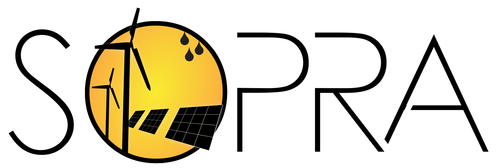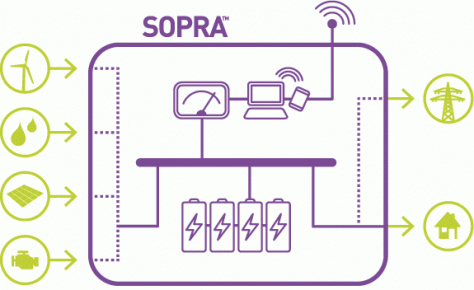SOPRA
SOPRA - Sustainable off-grid power plant for rural applications

Roughly a quarter of the world’s population goes without electricity. These people, mainly in isolated areas, do not benefit from the domestic appliances and lighting that most of us take for granted. Because grid connection is too expensive for remote areas, an off-grid power plant is needed.
Project Description
The SOPRA project is developing a modular, sustainable, off-grid power station for rural applications. The SOPRA system consists of renewable energy sources (wind, solar, hydropower), electricity storage (batteries or other) and back-up diesel power. Together, they will provide power to the consumers connected to the power station, e.g. a remote village. The core of the SOPRA system is the multi-source hybrid inverter (MHI) that connects all of the sources together, enables them all to run in their optimum operational state and defines the micro-grid of the system. The project focuses on the design and development of this MHI, demonstration of the system in three locations in the Netherlands, development of a SOPRA optimization tool, and business development for cooperative exploitation of the SOPRA system.
Objectives
The aim of the project is to develop a cost-effective, modular, off-grid power station with the right combination of renewable energy sources, electricity storage and back-up diesel power. The second objective is to ultimately have an optimization tool for the most cost-effective combination of the SOPRA components, given a certain location and power demand profile. This optimization tool will be used to translate customer needs into the optimum SOPRA system.
Benefits
With a SOPRA system, customers in remote areas can be provided with cost-effective, sustainable, reliable electric power, focusing on renewable power and running generator sets only when absolutely necessary (thus minimizing fossil fuel dependency).
With the results of the SOPRA project, solution providers will benefit from the multi-functional converter at the heart of the system, and also from the optimization tool for efficient dimensioning of the power station. Besides remote villages, military compounds, refugee camps and disaster response field hospitals could also benefit from having a rationally designed modular power system. The concept even has potential applications in the western world for settings such as island communities and energy-neutral residential neighborhoods.
Project coordinator
- DNV GL, the Netherlands
Project details
- Funded by the European Fund for Regional development
Project partners
- Exendis, Bredenoord, Wind Energy Solutions (WES), PFIXX Solar, Alliander DSO, HAN University and Delft University of Technology (all project partners are from the Netherlands)
